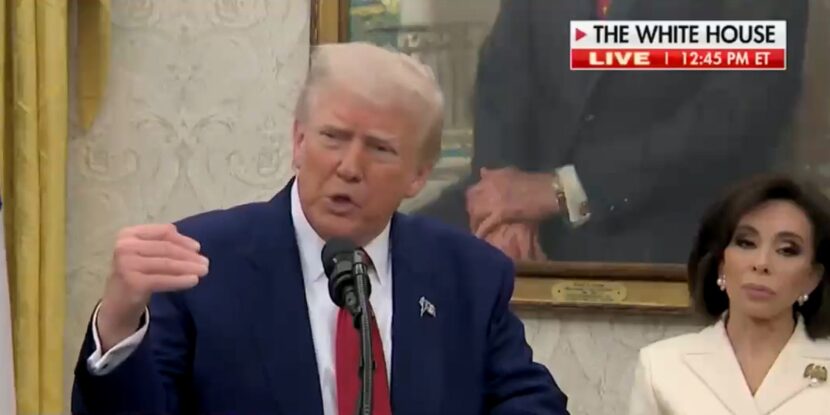
PULSE POINTS:
❓What Happened: President Donald J. Trump says “Harvard wants to fight” his administration, but is losing badly, and must hand over the names of its foreign students if it wants to deescalate tensions with the White House.
👤Who’s Involved: President Trump, Harvard University, the Department of Homeland Security, and foreign students enrolled under the Student and Exchange Visitor Program (SEVP).
Your free, daily feed from The National Pulse.
🧾Key Quote: “Harvard wants to fight. They want to show how smart they are, and they’re getting their ass kicked,” Trump said.
⚠️Fallout: The administration has frozen $3 billion in federal funding, moved to strip Harvard of its SEVP certification, and blocked new foreign visa appointments—threatening to cost the university hundreds of millions in tuition revenue.
📌Significance: Trump’s hard line against Harvard signals a broader crackdown on elite institutions accused of harboring antisemitism and evading federal oversight, while putting foreign student programs under unprecedented scrutiny.
IN FULL:
President Donald J. Trump is stipulating that Harvard University must hand over the names of its foreign students if it wants to rachet down its conflict with the White House. Speaking in the Oval Office on Wednesday, the America First leader emphasized that “Harvard wants to fight” and that his administration is ready to continue increasing pressure on the university to comply with federal directives on antisemitism and foreign student visa vetting.
“So, we have to look at the list, and Harvard has to understand, the last thing I want to do is hurt them. They’re hurting themselves,” President Trump said, referring to his administration’s requests for the university to enact reforms and crack down on anti-Semitic activists and demonstrations on campus. “Harvard wants to fight. They want to show how smart they are, and they’re getting their ass kicked.”
Trump: “Harvard wants to fight. They want to show how smart they are, and they’re getting their ass kicked.”
— The Post Millennial (@TPostMillennial) May 28, 2025
In recent weeks, the Trump administration has suspended an estimated $3 billion in federal funding for Harvard, tied to concerns it is failing to tackle anti-Semitism and discriminating against white and Asian applicants in favour of less qualified applicants from other groups.
Additionally, the Department of Homeland Security (DHS) has moved to revoke the university’s Student and Exchange Visitor Program (SEVP) certification. Around 27 percent of Harvard’s total enrolled student population is foreign, at just under 7,000. With the total cost for a foreign student to attend the Ivy League university estimated to be over $100,000 per year, the loss of those students could be a crippling financial blow to Harvard, in the hundreds of millions of dollars each year.
An Obama-appointed judge blocked this specific move, but the administration subsequently suspended the importation of foreign students generally, until new social media vetting processes are established.
While Harvard has tried to appear defiant to Trump’s White House directives in public, it is widely reported that the university’s administration is privately panicking over the reputational damage and financial burden the school is facing. Harvard is currently engaged in several ongoing lawsuits against the Trump administration.

Israeli Prime Minister Benjamin Netanyahu has announced the elimination of Hamas Gaza chief Mohammad Sinwar, the younger brother of the group’s deceased leader Yahya Sinwar.
Speaking at the Knesset, Netanyahu declared, “We have eliminated Mohammed Deif, Yahya Sinwar, and Mohammed Sinwar,” marking another blow to the terrorist organization responsible for the October 7, 2023, massacre.
Your free, daily feed from The National Pulse.
The announcement underscores Israel’s relentless campaign to dismantle Hamas, a mission aligned with President Donald J. Trump’s unwavering support for America’s key ally in the Middle East.
Mohammad Sinwar’s killing comes seven months after the death of his brother Yahya, known as the architect of the October 7 attack, who was taken out on October 17, 2024, in Rafah, Gaza.
This story is developing…
show less
Israeli Prime Minister Benjamin Netanyahu has announced the elimination of Hamas Gaza chief Mohammad Sinwar, the younger brother of the group’s deceased leader Yahya Sinwar. show more

PULSE POINTS:
❓What Happened: New analysis suggests only a concerningly small number of Department of Government Efficiency (DOGE) cuts can actually be reviewed and verified.
👥 Who’s Involved: Elon Musk, DOGE, the Trump administration, critics of DOGE, and Open the Books auditors.
Your free, daily feed from The National Pulse.
📍 Where & When: The analysis was published by Open the Books on Tuesday, May 27, 2025.
💬 Key Quote: “DOGE is an advisory group; we are doing the best we can as an advisory group. We do not make the laws, nor do we control the judiciary, nor do we control the Executive Branch.” – Elon Musk.
⚠️ Impact: Transparency concerns persist regarding the verification of claimed savings by DOGE, with taxpayers struggling to confirm many of the savings figures.
IN FULL:
New analysis suggests that many of the claimed cuts to nondiscretionary spending enacted by the Department of Government Efficiency (DOGE) cannot be easily reviewed or verified. The external audit of DOGE data is raising concerns about a lack of transparency behind the advisory agency’s methodology and claims, as it appears to be largely winding down its mission ahead of Elon Musk’s possible departure as a special government employee.
The Trump administration has credited DOGE with saving taxpayers $160 billion by targeting wasteful spending through canceled grants, contracts, and other measures. However, critics, including some on the right, dispute the validity of those savings. Open the Books, an independent watchdog, analyzed DOGE’s claims and found that only 42 percent of contracts and 27 percent of grants could be easily verified through public records.
According to Open the Books, the discrepancies largely stem from a lack of real-time transparency in government spending systems, such as USASpending.gov and the Federal Procurement Data System (FPDS). For instance, DOGE claimed savings of $32,366 on a State Department grant to a Chilean university, but public records show no corresponding outlay to confirm the figure. Similarly, a Department of Defense grant to the University of Wisconsin showed conflicting values between DOGE’s data and FPDS records.
Other problems faced by those trying to review and understand the DOGE data include federal contracts listed as Indefinite Delivery Vehicles (IDV). According to Open the Books, “This type of contract allows the government to sign a contract for a certain value, but pay for goods or services over time and negotiate those costs separately per instance.”
The watchdog group gives an example of a contract “…between the Department of Energy and Kumono Government Services, LLC [which] is for security and safety trainings at the DOE’s National Training Center in Albuquerque. Both DOGE and the FPDS roughly agree on the contract value. DOGE has it at $179,000,000 even, which FPDS says the total contract value is $179,637,339.14.”
“DOGE says they saved taxpayers $15,652,636.00 on this contract. But the FPDS shows a smaller current contract value of $31,303,271.64. It also reflects a total order value, presumably money already spent, of $117,901,211. Regardless of how one parses those numbers, it’s impossible to verify the $15.6M of savings,” Open the Books explains.
Another area of contention is that many of the recommended DOGE cuts are to non-discretionary spending, which will need to be codified either through rescissions enacted by Congress or through appropriations cuts enacted by lawmakers later this year. While fiscal conservative activists have tried to claim that Congress can enact DOGE cuts in the current reconciliation bill, these claims are actually untrue. Senate rules stipulate that budget reconciliation legislation can only address discretionary spending, of which the bill makes $1.6 trillion in cuts over the 10-year budget window.
Despite the transparency concerns raised by Open the Books, Elon Musk, who has served as the informal chief of the DOGE initiative, still claims that the group has largely accomplished its goals. During an interview at the Qatar Economic Forum, Musk stated: “We do not make the laws, nor do we control the judiciary, nor do we control the Executive Branch. We are simply advisors. In that context, we are doing very well.”
“We cannot take action beyond that because we are not some sort of imperial dictator of the government,” Musk said.
To better open the DOGE cutting process to public scrutiny, Open the Books is advocating that the public be allowed access to a modified version of the Treasury Payment System, which would allow those interested to track spending in real time. This mechanism could also help voters to better influence their elected officials as to what cuts they would want to see prioritized.
show less

 1 month ago
2
1 month ago
2








 English (US) ·
English (US) ·